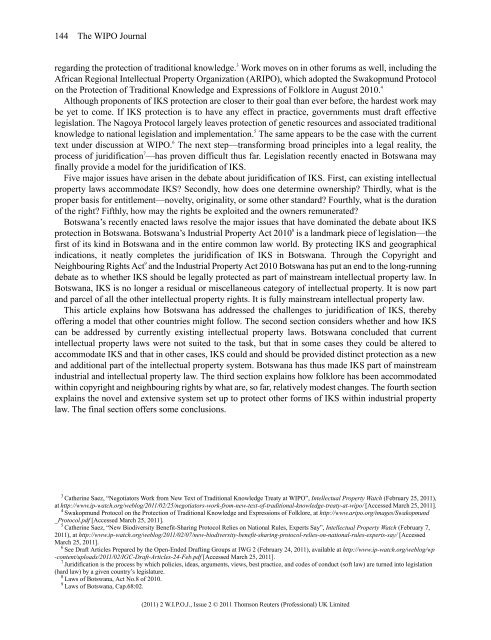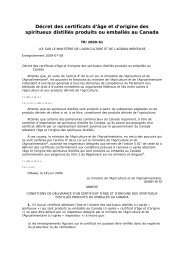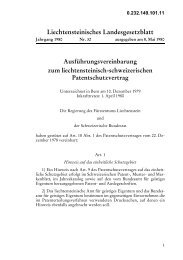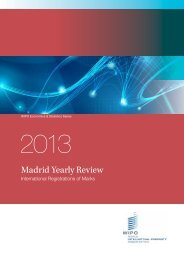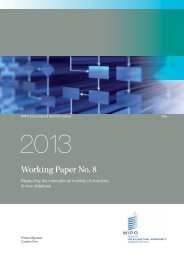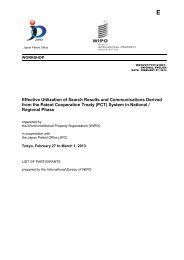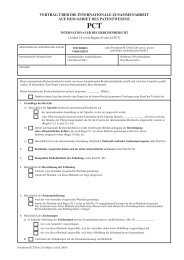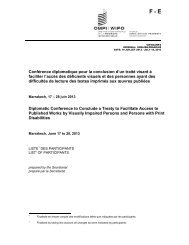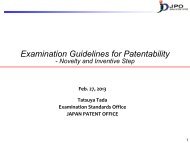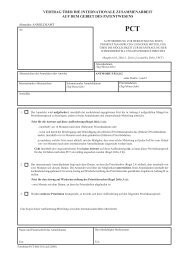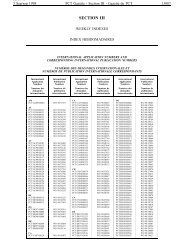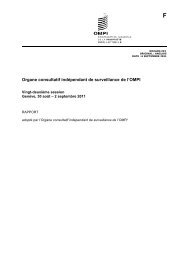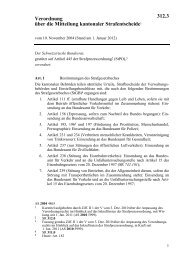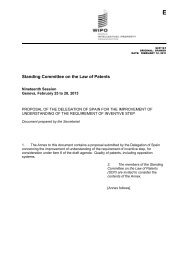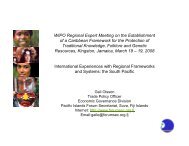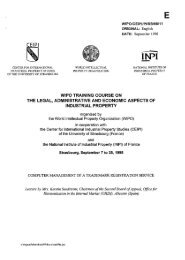WIPO Journal - World Intellectual Property Organization
WIPO Journal - World Intellectual Property Organization
WIPO Journal - World Intellectual Property Organization
You also want an ePaper? Increase the reach of your titles
YUMPU automatically turns print PDFs into web optimized ePapers that Google loves.
144 The <strong>WIPO</strong> <strong>Journal</strong><br />
regarding the protection of traditional knowledge. 3 Work moves on in other forums as well, including the<br />
African Regional <strong>Intellectual</strong> <strong>Property</strong> <strong>Organization</strong> (ARIPO), which adopted the Swakopmund Protocol<br />
on the Protection of Traditional Knowledge and Expressions of Folklore in August 2010. 4<br />
Although proponents of IKS protection are closer to their goal than ever before, the hardest work may<br />
be yet to come. If IKS protection is to have any effect in practice, governments must draft effective<br />
legislation. The Nagoya Protocol largely leaves protection of genetic resources and associated traditional<br />
knowledge to national legislation and implementation. 5 The same appears to be the case with the current<br />
text under discussion at <strong>WIPO</strong>. 6 The next step—transforming broad principles into a legal reality, the<br />
process of juridification 7 —has proven difficult thus far. Legislation recently enacted in Botswana may<br />
finally provide a model for the juridification of IKS.<br />
Five major issues have arisen in the debate about juridification of IKS. First, can existing intellectual<br />
property laws accommodate IKS? Secondly, how does one determine ownership? Thirdly, what is the<br />
proper basis for entitlement—novelty, originality, or some other standard? Fourthly, what is the duration<br />
of the right? Fifthly, how may the rights be exploited and the owners remunerated?<br />
Botswana’s recently enacted laws resolve the major issues that have dominated the debate about IKS<br />
protection in Botswana. Botswana’s Industrial <strong>Property</strong> Act 2010 8 is a landmark piece of legislation—the<br />
first of its kind in Botswana and in the entire common law world. By protecting IKS and geographical<br />
indications, it neatly completes the juridification of IKS in Botswana. Through the Copyright and<br />
Neighbouring Rights Act 9 and the Industrial <strong>Property</strong> Act 2010 Botswana has put an end to the long-running<br />
debate as to whether IKS should be legally protected as part of mainstream intellectual property law. In<br />
Botswana, IKS is no longer a residual or miscellaneous category of intellectual property. It is now part<br />
and parcel of all the other intellectual property rights. It is fully mainstream intellectual property law.<br />
This article explains how Botswana has addressed the challenges to juridification of IKS, thereby<br />
offering a model that other countries might follow. The second section considers whether and how IKS<br />
can be addressed by currently existing intellectual property laws. Botswana concluded that current<br />
intellectual property laws were not suited to the task, but that in some cases they could be altered to<br />
accommodate IKS and that in other cases, IKS could and should be provided distinct protection as a new<br />
and additional part of the intellectual property system. Botswana has thus made IKS part of mainstream<br />
industrial and intellectual property law. The third section explains how folklore has been accommodated<br />
within copyright and neighbouring rights by what are, so far, relatively modest changes. The fourth section<br />
explains the novel and extensive system set up to protect other forms of IKS within industrial property<br />
law. The final section offers some conclusions.<br />
3<br />
Catherine Saez, “Negotiators Work from New Text of Traditional Knowledge Treaty at <strong>WIPO</strong>”, <strong>Intellectual</strong> <strong>Property</strong> Watch (February 25, 2011),<br />
at http://www.ip-watch.org/weblog/2011/02/25/negotiators-work-from-new-text-of-traditional-knowledge-treaty-at-wipo/ [Accessed March 25, 2011].<br />
4<br />
Swakopmund Protocol on the Protection of Traditional Knowledge and Expressions of Folklore, at http://www.aripo.org/images/Swakopmund<br />
_Protocol.pdf [Accessed March 25, 2011].<br />
5<br />
Catherine Saez, “New Biodiversity Benefit-Sharing Protocol Relies on National Rules, Experts Say”, <strong>Intellectual</strong> <strong>Property</strong> Watch (February 7,<br />
2011), at http://www.ip-watch.org/weblog/2011/02/07/new-biodiversity-benefit-sharing-protocol-relies-on-national-rules-experts-say/ [Accessed<br />
March 25, 2011].<br />
6<br />
See Draft Articles Prepared by the Open-Ended Drafting Groups at IWG 2 (February 24, 2011), available at http://www.ip-watch.org/weblog/wp<br />
-content/uploads/2011/02/IGC-Draft-Articles-24-Feb.pdf [Accessed March 25, 2011].<br />
7<br />
Juridification is the process by which policies, ideas, arguments, views, best practice, and codes of conduct (soft law) are turned into legislation<br />
(hard law) by a given country’s legislature.<br />
8 Laws of Botswana, Act No.8 of 2010.<br />
9 Laws of Botswana, Cap.68:02.<br />
(2011) 2 W.I.P.O.J., Issue 2 © 2011 Thomson Reuters (Professional) UK Limited


